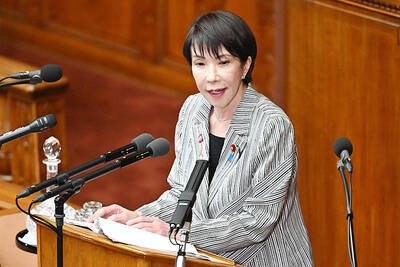China's foreign minister yesterday defended the decision to veto a UN Security Council resolution on Myanmar that would have called on the regime to free all political prisoners.
China and Russia blocked the US-sponsored measure in the council's first double veto for nearly 20 years, hampering Washington's efforts to press Myanmar's military junta over its human rights record.
"China's position is completely in accordance with the UN charter's spirit," Foreign Minister Li Zhaoxing (李肇星) said on the sidelines of the ASEAN summit in the Philippines, which is also being attended by Myanmar.
"It is in the interest of international peace and regional stability. It is in the people's interest," Li said. "If you read the UN charter, you would know why China voted this way."
He did not elaborate but China's UN ambassador said after the vote that the situation in Myanmar did "not represent a threat to international peace" -- one of the charter's standards for council action.
"China believes there's no need for the UN Security Council to get involved," Chinese Ambassador Wang Guangya (
Myanmar has kept Nobel Peace Prize-winner and democracy activist Aung San Suu Kyi in detention for much of the last two decades.
Her opposition political party won elections in 1990 but was never allowed to govern. Many of her supporters remain behind bars.
The US has accused the regime of torturing, raping and executing its own people, waging war on minorities and looking the other way while drug and human trafficking grows.
Myanmar has repeatedly proved a thorny issue for members of ASEAN, who are meeting this weekend in a resort in Cebu.
It has been slow to implement a pledged "road map" to democracy, and ASEAN countries have been debating the creation of their own charter -- which would allow them more sway over the internal affairs of member nations.
Student activists were set to hold a candlelight vigil outside the ASEAN gala banquet yesterday evening in Cebu to call for democracy in Myanmar, which has been ruled by the military since 1962.
The UN estimate there are 1,100 political prisoners in Myanmar.

The Central Weather Administration (CWA) yesterday said it expected to issue a sea warning for Typhoon Fung-Wong tomorrow, which it said would possibly make landfall near central Taiwan. As of 2am yesterday, Fung-Wong was about 1,760km southeast of Oluanpi (鵝鑾鼻), Taiwan’s southernmost point, moving west-northwest at 26kph. It is forecast to reach Luzon in the northern Philippines by tomorrow, the CWA said. After entering the South China Sea, Typhoon Fung-Wong is likely to turn northward toward Taiwan, CWA forecaster Chang Chun-yao (張峻堯) said, adding that it would likely make landfall near central Taiwan. The CWA expects to issue a land

Taiwan’s exports soared to an all-time high of US$61.8 billion last month, surging 49.7 percent from a year earlier, as the global frenzy for artificial intelligence (AI) applications and new consumer electronics powered shipments of high-tech goods, the Ministry of Finance said yesterday. It was the first time exports had exceeded the US$60 billion mark, fueled by the global boom in AI development that has significantly boosted Taiwanese companies across the international supply chain, Department of Statistics Director-General Beatrice Tsai (蔡美娜) told a media briefing. “There is a consensus among major AI players that the upcycle is still in its early stage,”

The Central Weather Administration (CWA) yesterday said it is expected to issue a sea warning for Typhoon Fung-wong this afternoon and a land warning tomorrow. As of 1pm, the storm was about 1,070km southeast of Oluanpi (鵝鑾鼻), Taiwan’s southernmost point, and was moving west-northwest at 28 to 32kph, according to CWA data. The storm had a radius of 250km, with maximum sustained winds of 173kph and gusts reaching 209kph, the CWA added. The storm is forecast to pass near Luzon in the Philippines before entering the South China Sea and potentially turning northward toward Taiwan, the CWA said. CWA forecaster Chang Chun-yao (張峻堯) said

Japanese Prime Minister Sanae Takaichi yesterday said that China using armed force against Taiwan could constitute a "survival-threatening situation" for Japan, allowing the country to mobilize the Japanese armed forces under its security laws. Takaichi made the remarks during a parliamentary session while responding to a question about whether a "Taiwan contingency" involving a Chinese naval blockade would qualify as a "survival-threatening situation" for Japan, according to a report by Japan’s Asahi Shimbun. "If warships are used and other armed actions are involved, I believe this could constitute a survival-threatening situation," Takaichi was quoted as saying in the report. Under Japan’s security legislation,